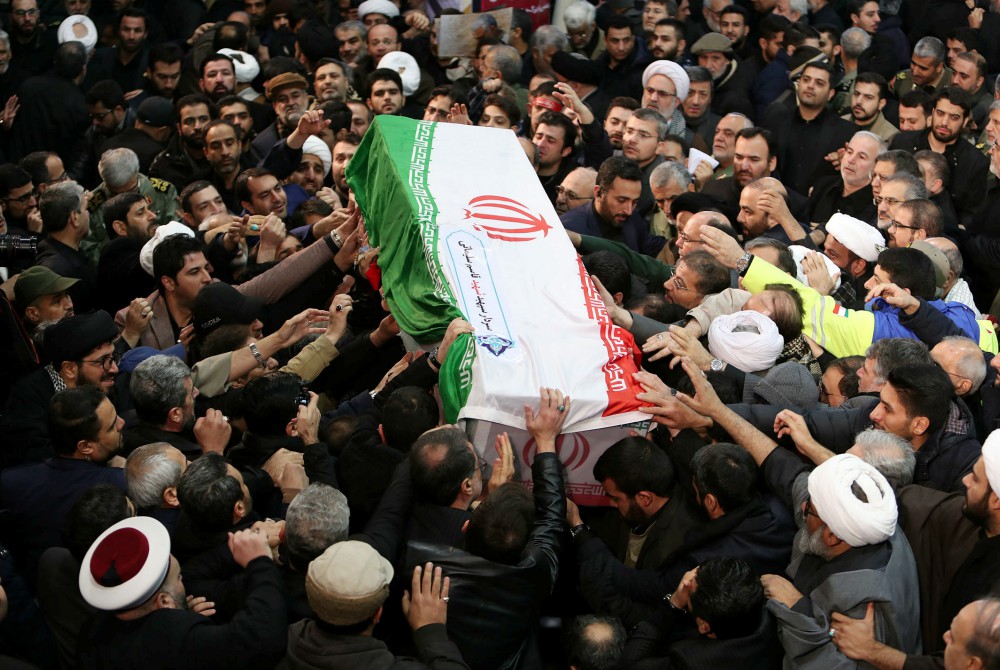
A formation of fighter jets emit trails in the Vatican colors of yellow and white before a Feb. 4, 2019, welcoming ceremony for Pope Francis at the entrance to the presidential palace in Abu Dhabi, United Arab Emirates. (CNS/Paul Haring)
After President Donald Trump's assassination of Iranian Gen. Qassem Soleimani, NCR asked a number of noted Catholic ethicists and moral theologians for their thoughts on the killing and the subsequent escalation of tensions between the two countries. Following are some of the responses, edited lightly for space and clarity.

Marie Dennis (CNS/Nancy Phelan Wiechec)
Marie Dennis
Co-president, Pax Christi International, 2010-19
Iran and the United States have taken a small step back from the brink of war. But President Trump's mention in his Jan. 8 speech of "harmony with other nations and prosperity at home" for Iranians, multinational cooperation, or pursuit of a better Iran nuclear deal were buried in his promise of additional economic sanctions that will further punish the people of Iran and in his arrogant talk about U.S. military might.
The radically transformed nonviolent approach necessary to achieve true peace and security for people of the Middle East and the world is nowhere to be seen. In fact, the use of lethal drones has inaugurated a new and dangerous phase in modern warfare that raises very serious moral and legal questions.
It is extremely troubling that the president of the United States would order the assassination of a senior Iranian military official, Gen. Qassem Soleimani, perpetrating an act of war that could have escalated violence in the region and beyond with disastrous human and environmental consequences. It is unconscionable that he might have done so to distract from his own domestic political troubles.
The only way forward is by the patient building of peace through respectful dialogue that addresses the deep roots of the disastrous relationship between Iran and the U.S. Every effort must be made to reinitiate the extremely difficult, multilateral diplomatic process that resulted in the Joint Comprehensive Plan of Action, known colloquially as the Iranian nuclear deal, which was unilaterally repudiated by the Trump administration.
In the new diplomatic round, Pope Francis' insistence on the immorality of any nation's possessing nuclear weapons should be on the table. And Congress must reassert its authority to refuse authorization and block funding for war with Iran.

Tobais Winright (Provided photo)
Tobias Winright
Associate professor of theological ethics and health care ethics, St. Louis University
Co-editor, Can War Be Just in the 21st Century?: Ethicists Engage the Tradition (Orbis, 2015)
Since at least the time of Sts. Ambrose and Augustine (fourth century), the Catholic theological tradition has taught that the use of armed force must be morally justified and justly conducted. Killing anyone is a grave matter, so the decision to do so, as the Catechism of the Catholic Church stipulates, should receive "rigorous consideration," with the conditions or criteria regarded as "strict" rather than as mere suggestions.
This moral tradition was the source of the international laws of war that are in place today and to which the U.S. military is expected to adhere, even if the present president may neither know nor care about such principles. Contrary to his apparent view about morality not applying to war (and in contrast to some Catholics who have called for the church to no longer use or teach just war theory), the Catholic theological tradition holds that morality should still apply even when it comes to war (even though we pray and work for an end to war because of the many evils that accompany and result from it).
The use of force should be limited and proportionate, not "disproportionate" as threatened by President Trump.
The use of drones to kill terrorists would seem on the surface to limit the use of force, making it more "surgical" perhaps. However, it too has raised a number of questions that just war ethicists have been attempting to address ever since this technology became used more during President Barack Obama's administration.
With the most recent targeted drone killing of Iranian Gen. Qassem Soleimani, one of the concerns I have is related to what Pope Francis in his 2015 encyclical, Laudato Si', called the "technocratic paradigm." That is, technology can incline us to take shortcuts, to prefer an easy fix, and to bypass other dimensions for finding solutions to problems, such as actual contact and communication with other persons.
In other words, and to return to one of the criteria of just war theory, was the turning to a drone strike really a last resort? Was there no time to attempt other avenues for dealing with the alleged threat? And going back to the criterion of just cause, was Soleimani really posing a clear and present danger?
Even if the just war tradition has been abused most of the time, it provides us with important questions such as these that we are expected by our theological and ethical tradition to raise.
Advertisement
Lisa Sowle Cahill
J. Donald Monan Professor of Theology, Boston College
Author, Global Justice, Christology, and Christian Ethics (Cambridge University Press, 2013)
Every pope since Vatican II has condemned war as contradicting the Gospel, causing violence to spiral ahead. Yet they have never condemned self-defense or defense of the innocent. This paradox sets the stage for our response to the present Iran-U.S. situation.
Killing Soleimani could be justified in just war terms because he was an ongoing perpetrator of attacks on U.S. and allied forces, and used terrorist tactics that did not spare civilians. Yet this analysis is hardly problem-free.
There is no firm evidence that Soleimani posed an imminent threat. Just war criteria of proportionality and reasonable hope of success were not clearly satisfied, given the further dangerous destabilization of relations with both Iran and Iraq, and the prospect of military escalation. Right intention is highly questionable, given the potential utility of an Iran crisis as a distraction from the impeachment proceedings. Finally, consultation with appropriate U.S. officials and European partners was minimal or lacking. In particular, declaration of war — which assassination of a high-ranking official could readily be seen to constitute — is the prerogative of the U.S. Congress.
From the perspective of a nonviolent peace-building agenda, the most obvious lesson from this unnecessary crisis is the utter (and inevitable?) failure of just war arguments by government elites to provide anything close to objective evaluation of the moral use, limits and prospects of armed force. Deciders are sure to be compromised by prior actions, vested interests, political goals, and estimates of personal advantage. Trump supplies a caricature of the biased, ill-considered, self-aggrandizing decision-making that calls all "just war" arguments into question.
The conflict with Iran shows why diplomacy and soft power are key to avoiding war and should never be abandoned lightly, as Trump did in canceling U.S. support for the Iran nuclear deal. Going forward, President Trump and the Iranian leadership should refrain from further provocations or payback. They should try to implement alternatives short of violence as a practical and more effective "style of politics for peace" (Pope Francis, 2017 World Day of Peace Message).

Stephen Schneck (CNS/Tyler Orsburn)
Stephen Schneck
Director, Department of Politics, the Catholic University of America, 1995-2007
Executive director, Franciscan Action Network
For centuries, the Catholic teachings on military force turned on the just war doctrine. Military force could only be justified if it was used as a last resort for defense. Even when for defense, the use of military force was justifiable only in response to an active, ongoing attack causing significant and immediate harm — or, in extraordinary situations, in response to a dangerous material threat that was certain and truly imminent. To be justified, military responses must also have a probability of successfully advancing peace.
The slippery moral quandaries associated with drone warfare add to just war concerns, since attacks against those not on the battlefield or outside a state of war are unjust. Moreover, assassination is little more than execution and the catechism calls executions impermissible.
Applying these criteria, the assassination of Qassem Soleimani by the Trump administration must be ruled as unjustified. Military force was not the last resort, no imminent threat has been revealed, no state of war existed, the victims were not on the battlefield, assassination is execution, and the attack did not advance the prospects for peace.
However much blood Soleimani had on his hands, his assassination does not meet the measures of justifiability in just war teaching. Even more importantly, from the perspective of peacemaking, the assassination dangerously imperils the lives of people around the world, including Americans, and profoundly jeopardizes prospects for peace while heightening the danger of wider war. Given this, it must be concluded that the Trump administration's decision to assassinate was not only unjustified, it was immoral.
Kevin Ahern
Associate professor of religious studies, Manhattan College
President, ICMICA-Pax Romana
The brazen assassination of Gen. Soleimani and his companions is the culmination of nearly two decades of U.S. policy of targeted killings. In many ways, the ethical questions surrounding this high-profile killing of this government official are not entirely new and could have been raised under the previous two presidential administrations.
Extrajudicial killings, such as this one, are regarded by many as being in violation of international law and against the underlying principles of the just war tradition, including right authority, last resort and proportionality. An important question emerges with the claim of self-defense, generally understood as one of the only legal causes for military action under the U.N. Charter.
The Trump administration has been quick to argue that the killings were in response to an "imminent" threat, though it is difficult to judge the validity of this claim without clear evidence presented to the public or to an impartial body. Trump here follows the justifications for "striking first" as articulated in the Bush Doctrine of 2002 where the lines between preemptive attacks, licit responses to clearly immediate threats, and preventative attacks, illicit responses to less immediate threats, were blurred.
Given the history of manipulating evidence for "imminent" threats in the lead-up to the Iraq War, claims of immediate threats demands a greater degree of skepticism and scrutiny from the public.
On his 1979 visit to Auschwitz-Birkenau, St. John Paul II said: "War is caused not only by those who wage it directly but also by those who do not do everything in their power to avoid it." In the face of these recent events, many Catholics were deeply disappointed by the limited and slow response by the U.S. Conference of Catholic Bishops. This contrasts to the vocal role played by the bishops in the lead-up to the 2003 invasion of Iraq.
The U.S. bishops' conference holds a unique position that could actually influence the hearts and minds of some of the president's supporters, including members of Congress. At a time when so much is at stake and when Catholic teaching is moving increasingly toward nonviolence, many hope for a more robust collective response by U.S. church leadership. Such a response could go a long way to deescalate the growing drumbeat for war in the U.S. today.

Gerard Powers (CNS/Chaz Muth)
Gerard Powers
Director of Catholic peacebuilding studies, Kroc Institute, Keough School of Global Affairs, University of Notre Dame
There are four positive aspects of the U.S. debate over the legitimacy and wisdom of the drone attack that killed Iranian Gen. Soleimani.
First, much of the public debate has rightly focused on an ethics of efficacy: the risk of another major war in what is perhaps the world's most dangerous neighborhood. But the debate has also reflected a concern for an ethic of responsibility: whether the attack and the president's threats of attacks that are disproportionate or aimed at cultural targets meet norms governing the use of force, especially discrimination, military necessity and proportionality. That is moral progress, especially given that a seriousness of purpose and commitment to norms governing the use of force have not been hallmarks of this presidency.
Second, the public debate has reflected an appropriate and necessary hermeneutic of skepticism about the legitimacy and efficacy of the use of force. The just war tradition begins with a strong presumption against the use of force, which may be overridden only for extraordinarily strong reasons. The Trump administration (or any administration) should not be given the benefit of the doubt, but rather bears a heavy burden of proof to show, with clear and convincing evidence, that the use of military force is justified. As many have pointed out, the lack of clarity, consistency and specificity in the justifications offered by the administration certainly raises questions about whether that standard has been met in this case.
A third positive element of the current debate are the calls for congressional action. While the president rightly has considerable latitude in authorizing specific uses of force in response to actual or imminent threats, legitimate authority should be interpreted broadly. Congress has a responsibility to expressly authorize major uses of force that risk a major war.
Finally, the public debate suggests that we might be beginning to learn some of the right lessons about the country's two longest wars: Afghanistan and Iraq. The legitimacy and efficacy of the attack on Gen. Soleimani are critically important, but the more important question is how that attack or other potential uses of force fit with a much larger and more challenging responsibility of peacebuilding.
The use of force against Iran is only justifiable if it is tied to a realistic and serious effort to bring a just peace to a region that U.S. actions, such as withdrawal from the Iran nuclear agreement and especially the Iraq invasion, have done so much to destabilize. Rather than a muscular unilateralism, what is needed is restraint, dialogue and a commitment to use U.S. power and influence to promote cooperative security in the region.
[Joshua J. McElwee (jmcelwee@ncronline.org) is NCR Vatican correspondent. Follow him on Twitter: @joshjmac. Heidi Schlumpf (hschlumpf@ncronline.org) is NCR national correspondent. Follow her on Twitter @HeidiSchlumpf.]








